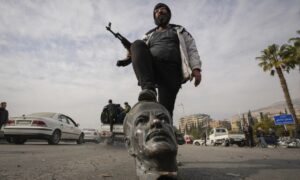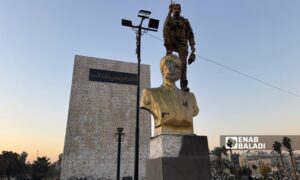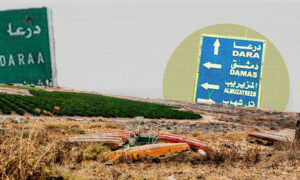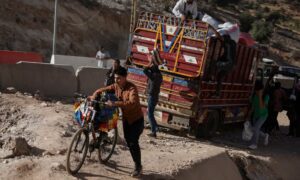Several warplanes hover above Idlib province; some affiliated with Russia and some with Turkey, added to them those operating under the US-led coalition, which have tactics different from their counterparts, as they strike “accurately” and at intervals, aiming at targets both unique and focused — the assembly posts of the al-Qaeda’s commanders.
The last of the airstrikes, conducted by the U.S. forces on August 31, targeted “an al Qaeda facility north of Idlib in Syria in an attack aimed at the organization’s leadership,” according to the U.S. Central Command, part of the Department of Defense.
“This operation targeted AQ-S leaders responsible for attacks threatening U.S. citizens, our partners, and innocent civilians,” stated Lt. Col. Earl Brown, CENTCOM Chief of Media Operations
Addressing al-Qaeda in Syria is not thought to have an impactful reaction on the ground, for the organization does not cover significant geographical batches in Syria. Its presence is rather limited to small areas in Idlib province, represented by jihadist formations, comprising little numbers of fighters, bound to the mother organization’s creed, however.
Targeting influential figures
The attack announced by the U.S. aimed at the Ansar al-Tawhid faction, operating under the Rouse the Believers Operations Room, which consists of fighter groups, of a former affiliation with the Jund al-Aqsa faction that adopts Salafist jihadism akin to the Islamic State (IS), the former Jabhat Fatah al-Sham, which dissolved into the Hayat Tahrir al-Sham (HTS) and the Turkistan Islamic Union, among others.
This is not the first time that Idlib gets subjected to such an attack, for the US-led coalition had hit sites on June 2019, saying that they belonged to the Guardians of Religion Organization, al-Qaeda’s wing in Syria, stationed in western rural Aleppo.
Back then, the US-led coalition’s attack on the Guardians of Religion Organization’s post led to the death of Abu Omar al-Tunissi, Judge of Borders and Reinforcement, as an informed source told Enab Baladi, in addition to leaders Abu Thar al-Masri and Abu Yahia al-Jaza’aeri, costing the organization its most influential figures and symbols.
The Guardians of Religion is al-Qaeda’s branch in Syria, even though the latter has not officially announced having any military roots in the Syrian territories.
In January 2018, the General Command of al-Qaeda made a statement, which implicitly stressed the spread of its militants in Syria, for the first time since al-Nusra Front, broke its affiliation with it.
The al-Qaeda-affiliated-al-Sahab Media Foundation published the statement titled “and incumbent upon Us was support of the believers”, through which the organization addressed its militants, spreading around the world, with a dedication to those in “Sham of Jihad”, in an indication to Syria.
Explosive devices also threaten al-Qaeda
The danger encompassing al-Qaeda and its commanders in Idlib is not limited to the airstrikes of the US-led coalition, hitting its facilities every now and then, but there are also explosive devices, which are becoming a prominent tool for the eradication of top commanders, without much ado while keeping the identity of the perpetrators undisclosed.
The US-led coalition raided the facility of Ansar al-Tawhid Army a few days after the death of a key leader of the Guardians of Religion and one of the prominent jihadist figures in Syria, Sari Shihab ed-Din, dubbed Suhayib and Abi Khalid al-Muhandes, for an explosive device was planted in his car in Idlib.
Abi Khalid al-Muhandes is one of the al-Qaeda’s veterans, arriving in Syria in 2015 from the Iranian prisons after he fought in Tora Bora, Afghanistan.
Al-Muhandes was released in a prisoner swap deal with Iran, for in return for letting him out, al-Qaeda released an Iranian diplomat it held captive in Yemen.
Four months before the death of Abi Khalad al-Muhandes, al-Qassam al-Aurduni, the Military Official of the Guardians of Religion (one of Khorasan Group’s commanders) was a target to two attempted assassinations in Idlib, the side behind which remains unknown.
Picture of Abu Khallad al-Muhandis, a Jordanian AQ veteran who was killed last week by an IED as he entered his car in Idlib pic.twitter.com/exzN3bovbm
— Tore Refslund Hamming (@ToreRHamming) August 29, 2019
Anything left for al-Qaeda in Syria?
In the present, the Guardians of Religion Organization can be considered the al-Qaeda’s sole representative in Syria, replacing the al-Nusra Front which was its only inheritor during the Syrian war, for the latter has broken its affiliation with al-Qaeda in September 2016 while Abu Mohammad al-Julani announced the foundation of the Jabhat Fatah al-Sham.
The Khorasan Group’s name went viral in 2014, also as an al-Qaeda-affiliated jihadist formation in Syria.
In September 2014, the group, positioned in two areas in western rural Aleppo, was targeted by Cruise missiles, launched from the U.S. frigates in the Gulf area and the Red Sea.
Since then, little to no information could be traced concerning the ambiguous Khorasan Group. However, U.S. officials had access to classified information related to it.
U.S. officials, in September 2014, said that the Khorasan Group consists of 20 veteran militants of al-Qaeda in the Middle East, Southern Asia and North Africa, whom Ayman al-Zawahiri, the al-Qaeda’s commander in Pakistan, sent to Syria.
if you think the article contain wrong information or you have additional details Send Correction
النسخة العربية من المقال
-
Follow us :












 A fighter of the al-Nusra Front getting prepared to participate in a battle in Idlib – 2015 (Reuters)
A fighter of the al-Nusra Front getting prepared to participate in a battle in Idlib – 2015 (Reuters)





 A
A
A
A
A
A








 More In-Depth
More In-Depth